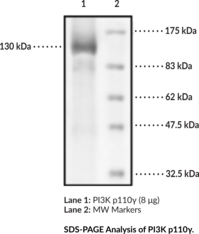Primary Eicosanoid HPLC Mixture
Primary Eicosanoid HPLC Mixture
This mixture contains the primary COX products produced by most mammalian tissues. Contents: Prostaglandin D2, Prostaglandin E2, 6-keto Prostaglandin F1?,...

€704.00 €598.40
Class I phosphatidylinositol 3-kinases (PI3Ks) are membrane-associated lipid kinases with roles in membrane trafficking during autophagy, endosome recycling, and endocytosis, adaptive and innate immune cell activation, and leukocyte chemotaxis, as well as various diseases.{57716,57715,57717} They are heterodimeric enzymes composed of a p110 catalytic subunit and a regulatory subunit and act on three substrates, non-phosphorylated phosphatidylinositol (PI), inositol monophosphate (PI(4)P), and inositol bisphosphate (PI(4,5)P2), to generate PI(3)P, PI(3,4)P2, and PI(3,4,5)P3, respectively.{57716,57715} The PI3K catalytic isoform p110? forms a complex with the regulatory subunits p101 or p87, also known as p84, and is selectively controlled by G protein-coupled receptors to regulate signaling.{57716} It is widely expressed, with high levels in cells of immune and hematopoietic origin, and dysregulation of p110? expression is associated with tumorigenesis and invasion in various solid tumors. The gene encoding PI3K p110?, PIK3CG, is located within the autism susceptibility locus, and SNPs in PIK3CG have been found in patients with the autism spectrum disorder tuberous sclerosis.{57714} Inhibition of PI3K p110? with small molecule inhibitors reduces joint inflammation and destruction in mouse models of rheumatoid arthritis, as well as reduces migration and accumulation of eosinophils in a mouse model of allergic pleurisy.{57717} Cayman’s PI3K p110? (human, recombinant) protein can be used for binding assays.
Territorial Availability: Available through Bertin Technologies only in France
| Size | 20 µg |
|---|---|
| Shipping | dry ice |
| Molecular weight | 0 |
| Host | Insect cells |
| Formulation | 25 mM Tris, pH 8.0, with 69 mM sodium chloride, 1.35 mM potassium chloride, 0.025% polysorbate 20, 3 mM DTT, and 50% glycerol |
| Purity | ≥80% estimated by SDS-PAGE |
| Custom code | 3504.00 |
| UNSPSC code | 12352203 |
Cayman Chemical’s mission is to help make research possible by supplying scientists worldwide with the basic research tools necessary for advancing human and animal health. Our utmost commitment to healthcare researchers is to offer the highest quality products with an affordable pricing policy.
Our scientists are experts in the synthesis, purification, and characterization of biochemicals ranging from small drug-like heterocycles to complex biolipids, fatty acids, and many others. We are also highly skilled in all aspects of assay and antibody development, protein expression, crystallization, and structure determination.
Over the past thirty years, Cayman developed a deep knowledge base in lipid biochemistry, including research involving the arachidonic acid cascade, inositol phosphates, and cannabinoids. This knowledge enabled the production of reagents of exceptional quality for cancer, oxidative injury, epigenetics, neuroscience, inflammation, metabolism, and many additional lines of research.
Our organic and analytical chemists specialize in the rapid development of manufacturing processes and analytical methods to carry out clinical and commercial GMP-API production. Pre-clinical drug discovery efforts are currently underway in the areas of bone restoration and repair, muscular dystrophy, oncology, and inflammation. A separate group of Ph.D.-level scientists are dedicated to offering Hit-to-Lead Discovery and Profiling Services for epigenetic targets. Our knowledgeable chemists can be contracted to perform complete sample analysis for analytes measured by the majority of our assays. We also offer a wide range of analytical services using LC-MS/MS, HPLC, GC, and many other techniques.
Accreditations
ISO/IEC 17025:2005
ISO Guide 34:2009
Cayman is a leader in the field of emerging drugs of abuse, providing high-purity Schedule I-V Controlled Substances to federally-licensed laboratories and qualified academic research institutions for forensic analyses. We are certified by ACLASS Accreditation Services with dual accreditation to ISO/IEC 17025:2005 and ISO Guide 34:2009.
This mixture contains the primary COX products produced by most mammalian tissues. Contents: Prostaglandin D2, Prostaglandin E2, 6-keto Prostaglandin F1?,...
To be used in conjunction with Cayman’s NAPE-PLD polyclonal antibody (aa 6-20) (Item No. 10306) to block protein-antibody complex formation...
This mixture contains the characteristic metabolites of both PGI2 and TXA2. Contents: Thromboxane B2, 11-dehydro Thromboxane B2, 6-keto Prostaglandin F1?,...
Histone H2A is a core histone that forms a dimer with histone H2B.{46631} Two histone H2A/H2B dimers form an octameric...
Platelet-activating factor (PAF) is an important lipid mediator involved in inflammation. PAF-acetylhydrolase (PAF-AH) is an extracellular phospholipase A2 which hydrolyzes...
This mixture contains primary prostaglandins produced from arachidonic acid and dihomo-?-linolenic acid. Contents: Prostaglandin E1, Prostaglandin E2, Prostaglandin F1?, 6-keto...
Protein phosphorylation is an important post-translational modification that serves many key functions to regulate a protein’s activity, localization, and protein-protein...
Programmed cell death protein 4 (PDCD4) levels are elevated during apoptosis and absent in many cancer samples.{16340,16167} Loss of PDCD4...
The cyclopentenone prostaglandin HPLC mixture contains all of the major UV-absorbing cyclopentenone prostaglandins and their precursors supplied in methyl acetate....
The Cayman COX Inhibitor Pack contains a combination of frequently used cyclooxygenase (COX) inhibitors. Each kit contains aspirin, the archetype...
Proprotein convertase subtilisin kexin 9 (PCSK9) is a member of the subtilisin serine protease family with an important role in...
Inositol hexakisphosphate kinase 2 (IP6K2) is a cytoplasmic kinase that catalyzes the conversion of IP6 to diphosphoinositol pentakisphosphate in the...
This mixture contains the primary metabolites of prostaglandins (PGs) D2, E2, and F2?. Contents: 13,14-dihydro-15-keto PGD2, 13,14-dihydro-15-keto PGE2, 11?-PGF2?, 13,14-dihydro-15-keto...
Amyloid-? (1-8, A2V) is a truncated form of amyloid-? (A?) that contains a valine to alanine substitution at position 2...
To be used in conjunction with Cayman’s FABP3 polyclonal antibody (Catalog No. 10233) to block protein-antibody complex formation during immunochemical...
GST-tag Polyclonal Antibody (FITC) is a probe for the immunochemical detection of GST tags on recombinant proteins. Recombinant proteins are...
Sirtuin 5 (SIRT5) is an enzyme that catalyzes the NAD-dependent removal of malonyl, succinyl, and glutaryl groups from target proteins.{55107,55108}...
Prostaglandin I synthase (PGIS) catalyzes the isomerization of PGH2 to PGI2. PGI2 (prostacyclin) is a potent vasodilator and inhibitor of...
Headquarters:
Parc d’activités du Pas du Lac
10 bis avenue Ampère
78180 Montigny le Bretonneux
France
Copyright © 2024 BERTIN BIOREAGENT. All rights reserved | Terms & conditions



